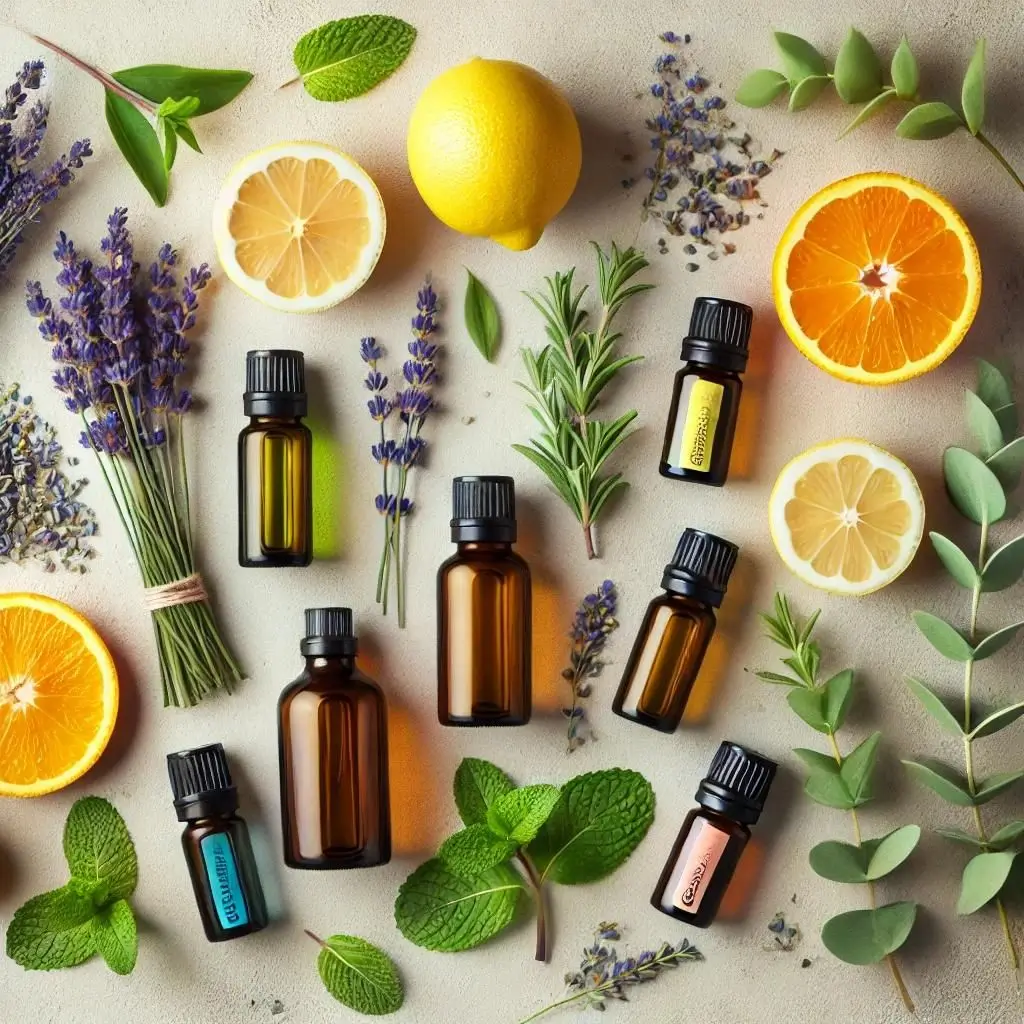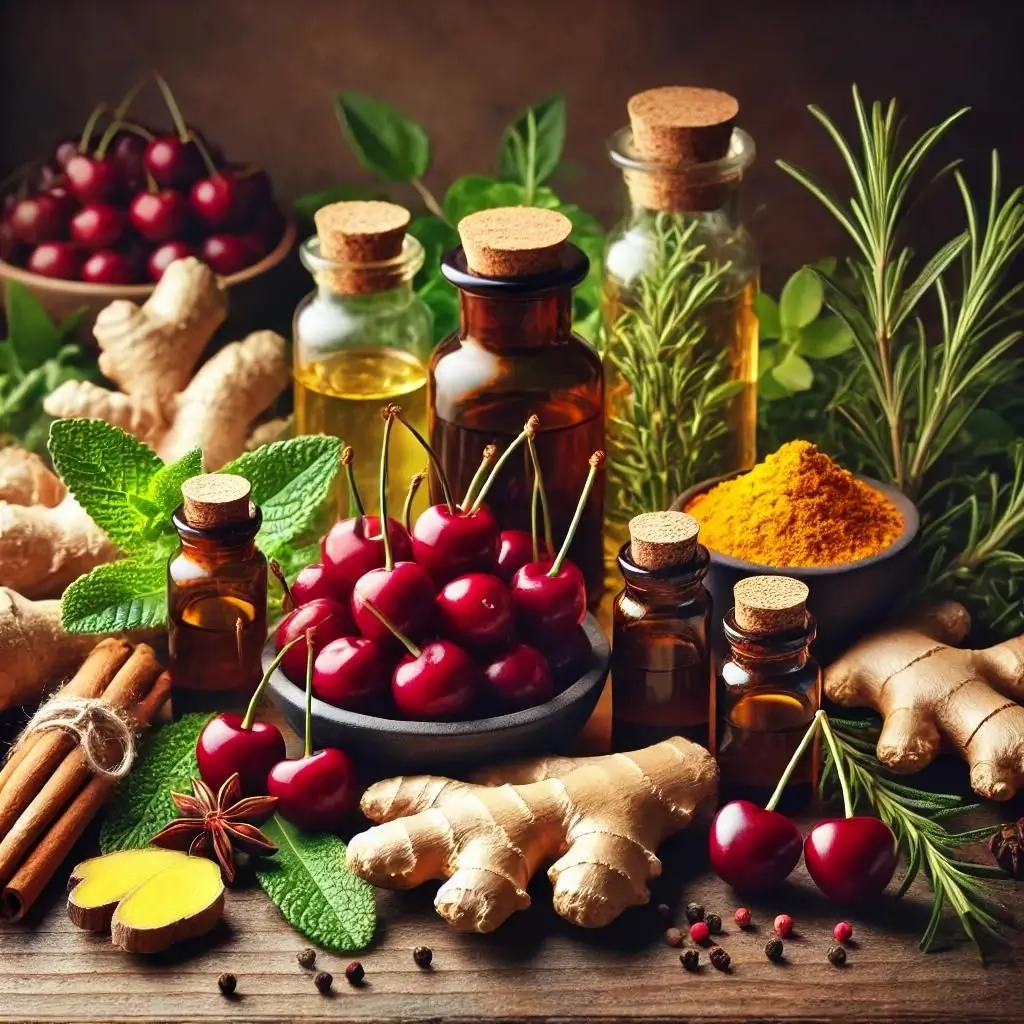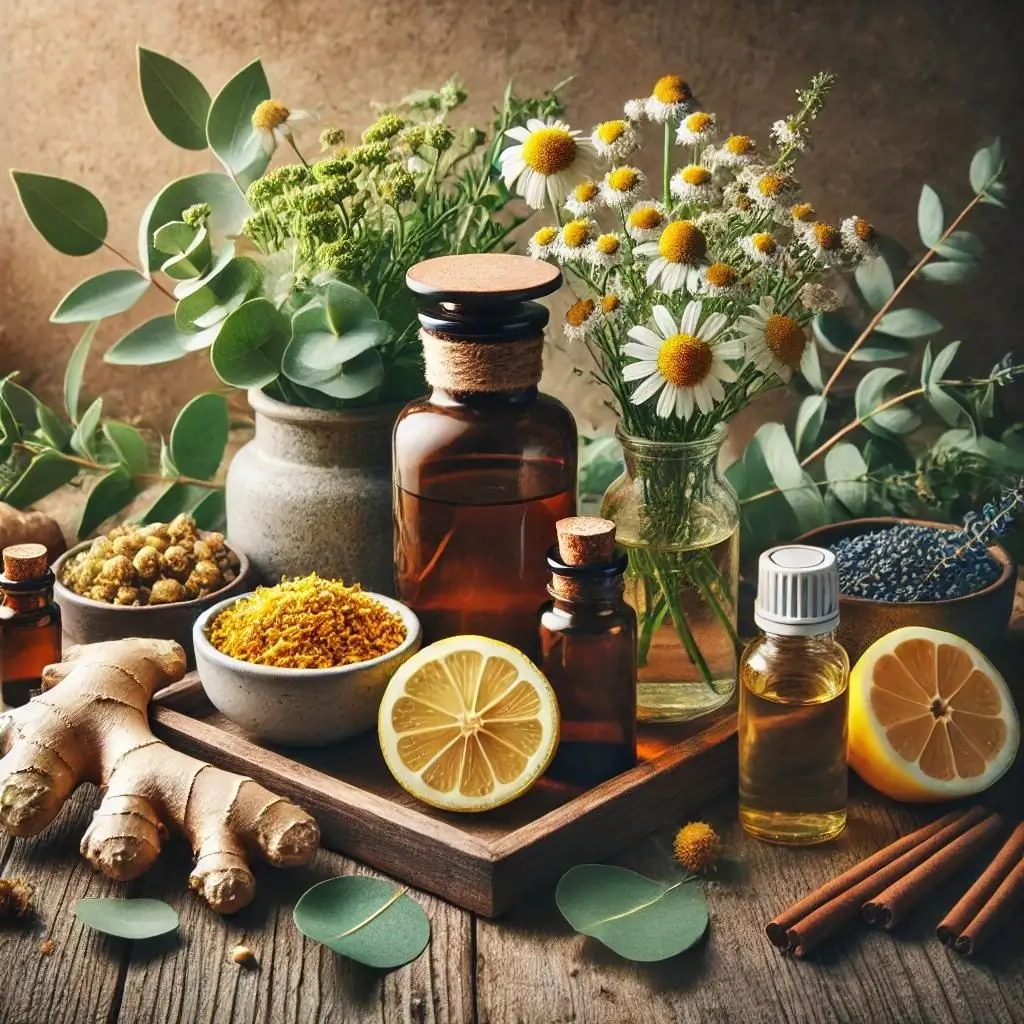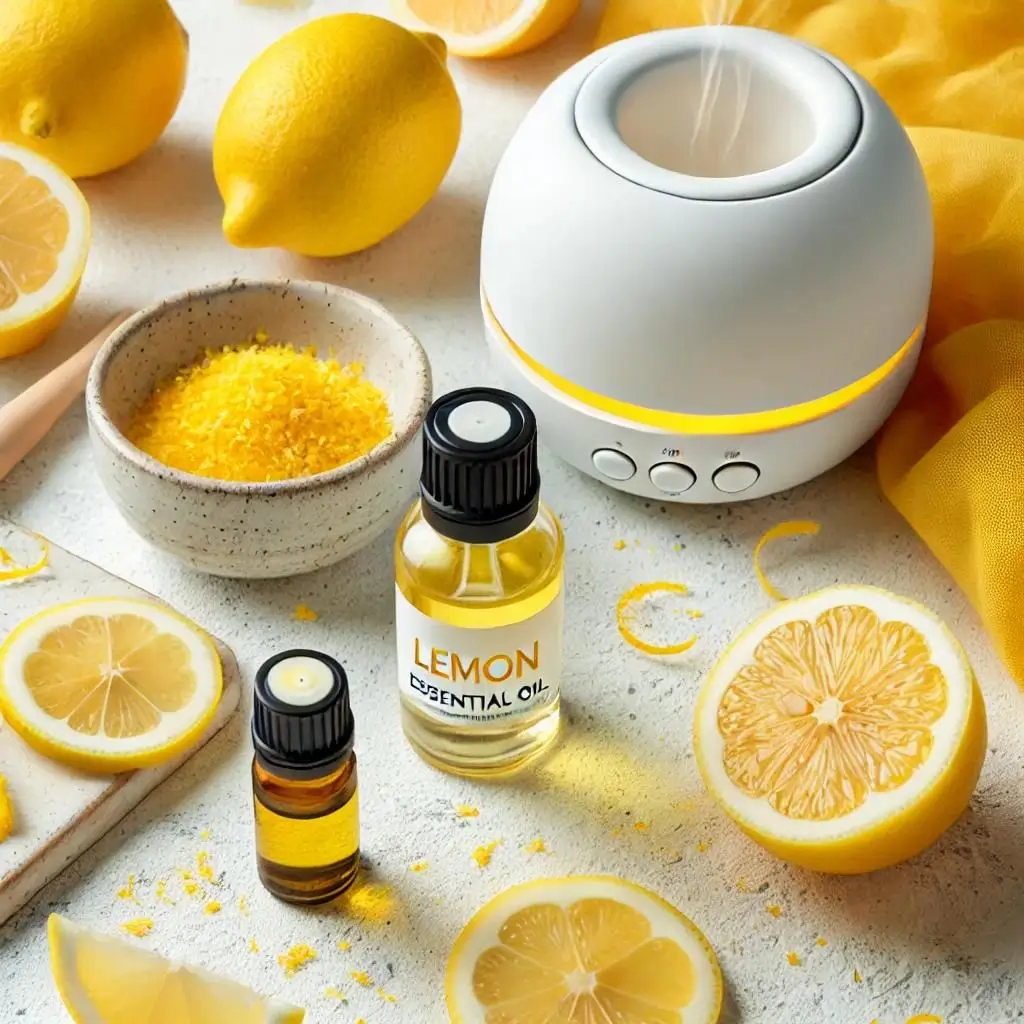Essential oils are concentrated extracts from plants, capturing the plant’s scent and flavor, or “essence.” They are commonly used for various purposes, from aromatherapy and skincare to cleaning products and natural remedies. This guide provides beginners with an in-depth understanding of essential oils, offering insights into their uses, benefits, and safety measures. By the end of this guide, you’ll have the knowledge to start exploring essential oils confidently and incorporate them into your daily routine.
What are essential oils, and how are they made?
Essential oils are natural extracts derived from plants, capturing their aromatic compounds and potent properties. These oils are extracted through methods such as steam distillation, cold pressing, or solvent extraction, depending on the plant type. Steam distillation is the most common method, where steam is used to vaporize the plant’s volatile compounds, which are then condensed back into liquid form.
Plants contain tiny sacs filled with these aromatic compounds. When processed, the plant material is broken down, and the essential oil is separated from the plant’s water-based components. This process ensures the purity and concentration of the essential oils, making them powerful and effective for various uses.
Essential oils contain unique blends of aromatic compounds, each offering distinct benefits. For example, lavender oil is known for its calming effects, while peppermint oil is invigorating and energizing. Understanding how essential oils are made and their chemical compositions helps beginners appreciate their potency and potential applications.
In summary, essential oils are highly concentrated plant extracts obtained through specialized extraction methods, preserving their natural aromas and beneficial properties. Here’s a table outlining the primary methods of extraction:
| Extraction Method | Description | Examples of Oils Produced |
|---|---|---|
| Steam Distillation | Uses steam to vaporize and collect plant essences | Lavender, Tea Tree, Peppermint |
| Cold Pressing | Mechanical process to extract oils from citrus peels | Lemon, Orange, Bergamot |
| Solvent Extraction | Uses solvents to dissolve and extract oils from flowers | Jasmine, Rose |

How do essential oils work?
Essential oils work primarily through their interaction with our olfactory system and skin. When inhaled, the aromatic molecules of essential oils interact with the olfactory receptors in the nose, which send signals to the brain’s limbic system. This area of the brain is responsible for emotions, mood regulation, and memory. Thus, inhaling essential oils can evoke emotional responses and affect mood and cognition.
Topically, essential oils are absorbed through the skin and enter the bloodstream, providing systemic effects. They can target specific concerns such as muscle soreness, skin irritations, or stress relief. However, due to their potency, essential oils are typically diluted with a carrier oil before being applied to the skin to prevent irritation.
Different essential oils have distinct properties based on their chemical composition. For instance, lavender oil contains linalool and linalyl acetate, known for their calming and sedative effects. In contrast, eucalyptus oil has eucalyptol, which has decongestant and antimicrobial properties.
Essential oils also have antimicrobial, anti-inflammatory, and antioxidant properties, contributing to their effectiveness in various applications. By understanding the mechanisms through which essential oils work, beginners can choose the right oils for their needs and use them effectively.
In conclusion, essential oils work by interacting with our olfactory system and skin, providing emotional and physiological benefits. Their effectiveness depends on the specific aromatic compounds present in each oil.
What are the best essential oils for beginners?
For beginners, starting with a few versatile and widely used essential oils is recommended. These oils offer various benefits and can be used in different applications. Here are some of the best essential oils for beginners:
- Lavender Oil: Known for its calming and relaxing properties, lavender oil is ideal for promoting relaxation and improving sleep quality. It’s also gentle on the skin, making it suitable for skincare applications.
- Peppermint Oil: This invigorating oil is excellent for boosting energy and mental clarity. It also has analgesic properties, making it useful for relieving headaches and muscle tension.
- Lemon Oil: With its uplifting and refreshing scent, lemon oil is perfect for enhancing mood and concentration. It’s also a powerful cleaning agent, effective for household cleaning.
- Tea Tree Oil: Renowned for its antimicrobial and antifungal properties, tea tree oil is a versatile option for treating skin conditions and infections.
- Eucalyptus Oil: This oil is known for its respiratory benefits, helping to relieve congestion and promote easier breathing. It’s also useful for soothing sore muscles and joints.
- Frankincense Oil: Often used for meditation and relaxation, frankincense oil has grounding and centering properties. It also supports skin health and can reduce the appearance of blemishes.
- Rosemary Oil: Rosemary oil is excellent for enhancing memory and concentration. It’s also beneficial for promoting healthy hair and scalp.
- Chamomile Oil: With its soothing and calming effects, chamomile oil is perfect for relaxation and stress relief. It’s also gentle enough for sensitive skin.
These essential oils are versatile and can be used in various ways, from aromatherapy to skincare. By starting with these beginner-friendly oils, you can explore the benefits of essential oils and find the ones that suit your preferences and needs.
How can beginners use essential oils safely?
Safety is crucial when using essential oils, especially for beginners who may be unfamiliar with their potency. Here are some essential tips for using essential oils safely:
- Dilute Properly: Always dilute essential oils with a carrier oil, such as coconut oil or jojoba oil, before applying them to the skin. A typical dilution ratio is 2-3 drops of essential oil per teaspoon of carrier oil.
- Patch Test: Before using a new essential oil, perform a patch test on a small area of skin to check for any allergic reactions or irritation. Wait 24 hours to ensure there is no adverse reaction.
- Avoid Sensitive Areas: Do not apply essential oils to sensitive areas such as the eyes, ears, or mucous membranes. If accidental contact occurs, rinse with a carrier oil rather than water.
- Inhalation Safety: When using essential oils for aromatherapy, ensure proper ventilation. Avoid inhaling essential oils directly from the bottle for extended periods.
- Use Caution with Children and Pets: Some essential oils can be harmful to children and pets. Always research the specific oils and consult with a healthcare professional if unsure.
- Storage: Store essential oils in a cool, dark place away from direct sunlight and out of reach of children and pets.
- Consult a Professional: If you are pregnant, nursing, or have a medical condition, consult with a healthcare professional before using essential oils.
By following these safety guidelines, beginners can enjoy the benefits of essential oils while minimizing the risk of adverse effects. Proper usage ensures a positive and rewarding experience with essential oils.
What are some common methods to use essential oils?
Essential oils can be used in various ways, depending on the desired benefits and applications. Here are some common methods for using essential oils:
- Aromatherapy Diffusion: Add a few drops of essential oil to a diffuser filled with water. The diffuser disperses the oil molecules into the air, creating a pleasant and therapeutic aroma.
- Inhalation: Inhale essential oils directly from the bottle or add a few drops to a tissue or cotton ball. Inhalation is effective for quick mood enhancement and respiratory support.
- Topical Application: Dilute essential oils with a carrier oil and apply them to the skin. Common areas for application include the wrists, temples, neck, and soles of the feet.
- Massage: Combine essential oils with a carrier oil to create a massage oil. Massage the blend into muscles and joints to relieve tension and promote relaxation.
- Bathing: Add a few drops of essential oil to a warm bath for a soothing and aromatic experience. Mix the oils with Epsom salts or a carrier oil before adding them to the water.
- Compress: Create a warm or cold compress by adding a few drops of essential oil to a bowl of water. Soak a cloth in the mixture and apply it to the affected area for relief.
- Cleaning: Use essential oils as natural cleaning agents. Add a few drops to cleaning solutions or create your own by mixing with water and vinegar.
These methods offer flexibility in how essential oils can be incorporated into daily routines. Experimenting with different methods allows beginners to find the most enjoyable and effective ways to use essential oils for their specific needs.
Are there any essential oils to avoid for beginners?
While many essential oils are safe for beginners, some are potent and should be used cautiously. Here are some essential oils that beginners may want to avoid or use with caution:
- Wintergreen Oil: Contains methyl salicylate, which can be toxic in large amounts. It should be used sparingly and never ingested.
- Clove Oil: Highly potent and can cause skin irritation if not properly diluted. Use with caution and always perform a patch test.
- Cinnamon Oil: Can cause skin sensitization and irritation. Dilute well and avoid using it on sensitive skin.
- Oregano Oil: Extremely potent with strong antimicrobial properties. Use sparingly and always dilute before application.
- Thyme Oil: Can be irritating to the skin and mucous membranes. Dilute well and avoid direct inhalation.
- Sage Oil: Contains thujone, which can be toxic in high doses. Use cautiously and avoid during pregnancy.
- Eucalyptus Oil: While beneficial for respiratory support, it can be toxic if ingested. Avoid using it around small children.
By being aware of these essential oils and their potential risks, beginners can make informed decisions about which oils to use and how to use them safely. Always research individual essential oils and consult with a healthcare professional if unsure.
Can essential oils be used for aromatherapy?
Yes, essential oils are widely used in aromatherapy, a holistic practice that uses natural plant extracts to promote health and well-being. Aromatherapy leverages the aromatic properties of essential oils to enhance physical, emotional, and mental health.
When inhaled, the aroma of essential oils stimulates the olfactory system, sending signals to the brain’s limbic system, which regulates emotions and memory. This interaction can evoke various emotional responses, such as relaxation, stress relief, or increased energy.
Aromatherapy can be used for different purposes, including:
- Relaxation and Stress Relief: Essential oils like lavender, chamomile, and ylang-ylang are known for their calming and soothing effects, helping to reduce stress and promote relaxation.
- Mood Enhancement: Citrus oils like lemon, orange, and bergamot have uplifting and energizing properties, enhancing mood and boosting positivity.
- Focus and Concentration: Essential oils such as rosemary and peppermint can improve mental clarity and focus, making them ideal for studying or working.
- Sleep Improvement: Oils like lavender and vetiver can promote restful sleep and improve sleep quality.
- Respiratory Support: Eucalyptus and peppermint oils can help clear the airways and promote easier breathing.
Aromatherapy offers a natural and non-invasive approach to supporting overall well-being. By incorporating essential oils into daily routines, individuals can experience the therapeutic benefits of aromatherapy.
How can I choose high-quality essential oils?
Choosing high-quality essential oils is essential to ensure their effectiveness and safety. Here are some tips for selecting the best essential oils:
- Purity: Look for essential oils labeled as “100% pure” and free from additives, fillers, or synthetic fragrances. Pure oils retain the plant’s natural benefits.
- Reputable Brands: Purchase essential oils from reputable and established brands known for their quality and transparency. Research the company’s sourcing and production practices.
- Botanical Name: Check the label for the botanical name of the plant. This ensures you’re getting the right oil and helps avoid confusion with similar oils.
- Extraction Method: Choose essential oils extracted using methods like steam distillation or cold pressing. These methods preserve the oil’s purity and potency.
- Packaging: Essential oils should be stored in dark glass bottles to protect them from light and oxidation. Avoid oils sold in plastic or clear containers.
- Price: High-quality essential oils are typically more expensive due to the cost of sourcing and production. Be wary of unusually cheap oils, as they may be diluted or synthetic.
- Third-Party Testing: Look for oils that have been tested by third-party laboratories for purity and quality. Some brands provide certificates of analysis (COA) for transparency.
By following these guidelines, beginners can choose high-quality essential oils that offer the best benefits and ensure a safe and rewarding experience.
What are some easy DIY essential oil recipes for beginners?
Creating DIY essential oil recipes is a fun and creative way for beginners to explore the versatility of essential oils. Here are some easy and popular recipes to try:
1. Relaxing Bath Soak
- 1 cup Epsom salt
- 10 drops of lavender essential oil
- 5 drops of chamomile essential oil
- Mix the ingredients and add to a warm bath for relaxation.
2. Energizing Room Spray
- 1 cup distilled water
- 10 drops of lemon essential oil
- 5 drops of peppermint essential oil
- Combine in a spray bottle and shake well before use.
3. Calming Roller Blend
- 10 ml roller bottle
- 10 drops of lavender essential oil
- 5 drops of frankincense essential oil
- Fill with carrier oil and apply to wrists and temples.
4. Homemade Surface Cleaner
- 1 cup water
- 1/2 cup white vinegar
- 10 drops of tea tree essential oil
- 10 drops of lemon essential oil
- Mix in a spray bottle and use for cleaning surfaces.
5. Sleep-Enhancing Diffuser Blend
- 3 drops of lavender essential oil
- 2 drops of cedarwood essential oil
- 1 drop of vetiver essential oil
- Add to a diffuser before bedtime to promote restful sleep.
These simple DIY recipes allow beginners to experiment with essential oils and discover their favorite blends. Remember to label each blend and store them properly for future use.
Can essential oils be used for cleaning and other household purposes?
Essential oils are not only valuable for personal care but also practical for cleaning and household purposes. Their antimicrobial properties make them effective natural alternatives to conventional cleaning products. Here are some ways essential oils can be used for cleaning:
- All-Purpose Cleaner: Combine water, vinegar, and essential oils like lemon or tea tree to create an all-purpose cleaner for surfaces.
- Air Freshener: Add a few drops of essential oils to a diffuser or spray bottle with water to freshen the air naturally.
- Laundry Freshener: Add a few drops of essential oil to a wool dryer ball to infuse laundry with a pleasant scent.
- Carpet Deodorizer: Mix baking soda with essential oils like lavender or eucalyptus and sprinkle on carpets before vacuuming.
- Dish Soap Boost: Add a few drops of lemon or grapefruit essential oil to dish soap for extra grease-cutting power and a refreshing scent.
Using essential oils for cleaning provides a chemical-free way to maintain a clean and pleasant home environment. They add a natural fragrance and can help reduce exposure to harsh chemicals in conventional cleaning products.
Conclusion
Essential oils offer a wide range of benefits and applications for beginners and experienced users alike. With their natural properties and versatility, essential oils can enhance well-being, promote relaxation, and provide effective solutions for various needs. By following safety guidelines and starting with beginner-friendly oils, you can explore the world of essential oils and discover their many advantages. Remember to choose high-quality oils, experiment with different methods, and enjoy the journey of incorporating essential oils into your daily life.



